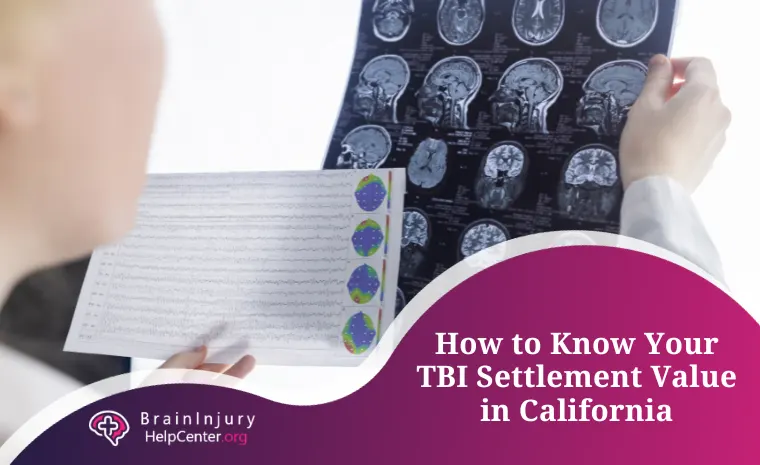How to Know Your TBI Settlement Value in California
Traumatic brain injuries (TBIs) can be life-changing events, and if you or a loved one has experienced one in California, you’re likely facing many questions. Among them, the most pressing might be, “What’s the TBI settlement value in California, and how does it work?”
Whether you or a loved one has suffered a severe or minor injury in California, understanding the settlement value of such a case is crucial. In this article, we will explore what TBI is, various factors that influence the compensation victims can receive, and the process of TBI claims in California.
Suffered TBI due to an accident? We can help you get compensation.
What is a TBI?
A traumatic brain injury (TBI) is a serious injury that affects the brain due to a sudden and forceful impact, a blow, or a penetrating head injury. TBIs can have a profound impact on a person’s life, causing a wide range of physical, cognitive, and emotional symptoms, such as:
- Severe headache
- Loss of balance, dizziness, and disorientation
- Loss of consciousness
- Sensory problems (ringing in ears, blurred vision, frequent bad taste in mouth)
These injuries can occur in various ways, and it’s essential to understand the different types of injury:
- Closed Head Injury: A closed head injury is the most common type of TBI. It occurs when there is a blow or jolt to the head, but the skull remains intact. This impact can still cause damage to the brain due to the force involved. Common causes of closed head injuries include falls, car accidents, and sports-related accidents.
- Open Head Injury: An open head injury, also known as a penetrating head injury, happens when an object penetrates the skull and directly damages the brain. This type of TBI often results from accidents involving sharp objects or firearms. The severity of open head injuries can vary significantly.
- Diffuse Axonal Injury (DAI): DAI is a type of TBI that occurs when the brain rapidly shifts within the skull due to strong rotational forces. This movement can cause widespread damage to nerve fibers and can result from high-speed car accidents or violent shaking, as seen in cases of shaken baby syndrome.
- Concussion: Concussions are mild TBIs that typically do not involve permanent brain damage visible on imaging tests like CT scans or MRIs. However, they can still have long-term effects, leading to symptoms such as headaches, dizziness, and cognitive difficulties. Concussions are often seen in sports injuries, falls, and car accidents.
- Contusion: A contusion is a bruise on the brain tissue itself. It usually occurs when the brain strikes the inside of the skull due to a blow or impact. Contusions can vary in size and severity, and they may require surgical intervention in severe cases.

The Legal Process in California for TBI Claims
Pursuing a TBI settlement in California requires a clear understanding of the legal process. It involves several critical steps to ensure your rights are protected and that you have the best chance of receiving fair compensation for your injuries.
1. Consultation with an Attorney
The first step in the legal process is to consult with an experienced personal injury attorney who specializes in TBI cases. They will evaluate the details of your case, including the cause of the injury, the extent of your compensatory damages, and potential liability.
2. Investigation and Gathering Evidence
Your attorney will conduct a thorough investigation to gather evidence to support your claim. This may include collecting medical records, accident reports, witness statements, and expert opinions to establish liability and the extent of your injuries.
3. Filing a Lawsuit
If a fair settlement cannot be reached through negotiations with the at-fault party or their insurance company, your attorney may file a personal injury lawsuit on your behalf. This initiates the formal legal process.
4. Discovery Phase
During the discovery phase, both parties exchange information and evidence related to the case. This includes depositions, requests for documents, and interrogatories.
5. Mediation and Settlement Negotiations
Before proceeding to trial, many TBI cases in California go through mediation or settlement negotiations. Your attorney will work to reach a fair traumatic brain injury settlement that covers your damages without the need for a trial.
6. Trial (if necessary)
If a settlement cannot be reached, your case will proceed to trial. During the trial, both sides present their arguments and evidence, and a judge or jury will determine the outcome.
Types of Damages
In TBI settlement cases, various types of damages may be awarded to compensate the victim for their losses. These can include:
- Economic Damages: These are tangible financial losses, such as medical expenses, lost wages, and future earning potential. These damages are intended to cover the measurable costs resulting from the injury.
- Non-Economic Damages: These are less tangible losses, such as pain and suffering, emotional distress, loss of enjoyment of life, and loss of consortium. Non-economic damages aim to compensate for the emotional and psychological toll of the TBI.
- Punitive Damages: In rare cases where the responsible party’s actions were particularly egregious or intentional, punitive damages may be awarded to punish the wrongdoer and deter future misconduct.
Suffered TBI due to an accident? We can help you get compensation.
Factors Affecting TBI Settlement Value
The compensation a brain injury victim may receive for a traumatic brain injury case depends on several factors:
- Severity of the Injury: The more severe the injury, the higher the potential TBI settlement value in California. TBIs range from mild concussions to severe brain injuries, each with different implications for the victim’s life.
- Medical Expenses: Accurate documentation of all medical care related to the TBI is crucial. This includes hospital bills, rehabilitation costs, medication, assistive devices, physical therapy sessions, and ongoing treatment expenses.
- Lost Wages and Future Earnings: A TBI can lead to substantial lost wages. Calculating the potential loss of future earnings is a critical part of determining the settlement value.
- Pain and Suffering: Non-economic damages, such as mental anguish, depression, and anxiety are a significant component of TBI settlements. This accounts for the emotional and psychological toll of the injury.
- Liability and Negligence: Establishing liability and proving negligence on the part of the responsible party is essential for a successful personal injury claim.
- Pre-Existing Conditions: Pre-existing medical conditions can complicate TBI settlements. It’s crucial to differentiate between the victim’s medical history and TBI-related issues.
- Comparative Negligence: Comparative negligence is a factor that considers the degree of fault or negligence on the part of the injured person. In California, if the injured person is found to share some degree of fault for the accident or injury, their compensation may be reduced accordingly. Understanding how comparative negligence affects your case is important for assessing the final settlement value.
- Expert Witnesses: Expert witnesses can provide valuable testimony regarding the impact of the TBI on the victim’s life, influencing settlement negotiations.
Each of these factors plays a significant role in determining the final settlement value for a TBI case in California. It’s essential to work closely with a personal injury lawyer who can navigate these complexities to ensure you receive more than average settlement for traumatic brain injury.
Negotiating a TBI Settlement
Skillful negotiation is the cornerstone of securing the best possible TBI settlement. In this critical phase, having an experienced attorney by your side becomes an invaluable asset.
Navigating the intricate legal terrain of a TBI case is undeniably challenging. Therefore, it’s strongly advisable to enlist the services of a brain injury attorney well-versed in personal injury law. Their expertise can make all the difference in the outcome of your settlement negotiations. They can help you file traumatic brain injury claims and negotiate with the insurance adjuster.
FAQs on TBI Claims
Can I file a TBI claim if the injury occurred in the workplace?
Yes, you can file a TBI claim related to a workplace injury. Workers’ compensation may apply, but you may also explore third-party liability claims.
Do I need to hire an attorney for my TBI case, or can I handle it on my own?
While you can attempt to handle a TBI case on your own, it’s highly advisable to consult with an experienced personal injury attorney who specializes in TBI cases.
Are there any financial assistance programs for TBI survivors in California?
Yes, California offers various financial assistance programs and support services for TBI survivors. These programs can help cover medical expenses and provide rehabilitation services.
Do I need to fully understand my insurance coverage before I can file a claim for my medical costs?
Understanding the insurance coverage available to you is vital. California has laws that require drivers to carry liability insurance, but not all accidents are covered adequately. If the injury occurred in a car accident, you may need to file a claim with the at-fault driver’s insurance company. While you may review your insurance policy and know your rights regarding compensation, it is best to consult with a brain injury attorney.
Advocacy for TBI Awareness
Many TBI survivors in California become advocates for TBI awareness and prevention. Sharing your story and participating in advocacy efforts can help raise awareness about the importance of safety measures and early intervention in preventing TBIs.
Recovering from a traumatic brain injury in California is a challenging journey, but with the right support, resources, and legal representation, you can navigate the process and work towards a brighter future. Remember that seeking help and understanding your rights are essential steps in your path to recovery.
Legal Support for TBI Cases
Given the complexity of TBI cases, enlisting the assistance of a skilled personal injury attorney is highly recommended. They can guide you through the legal process, assess the potential value of your claim, and advocate on your behalf. An attorney will work diligently to ensure you receive fair compensation for your TBI-related expenses and losses.
If you or a loved one has experienced a TBI in California, know that you are not alone, and there is support available to you. Reach out to the Brain Injury Help Center at (866) 576-0936 for a free consultation.









